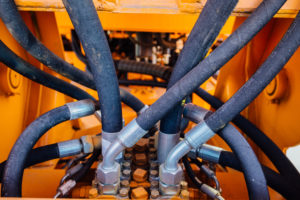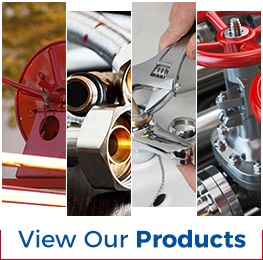
If you have any kind of experience with industrial hoses and/or hydraulic equipment, you are probably well aware that a damaged hydraulic hose is no joke. Using equipment hooked up to a malfunctioning hydraulic hose can lead to some scary possibilities from skin burns, to fire danger, to environmental contamination.
That said, it’s important that if you do come across a potentially dangerous hydraulic hose leak that you are prepared to know what to do.
Addressing the Problem
You may not know anything is wrong with your hydraulic hose until you go to use it and realize that it’s leaking. In the midst of a leak, turn off the system immediately. Remember, though, that just because a system is depressurized does not mean the coast is clear; pressure can still buildup, so keep your distance.
Whether there’s a visible or concealed leak, never use your bare hands to find or inspect the source of the leak when it’s hooked up to equipment. If the hot, pressurized fluid within your hose comes in contact with your skin, you could suffer from potentially fatal injuries that may require emergency care and/or surgery.
Once the system is depressurized, you can attempt to address the problem. The first thing you should do is check to see if the hose nut is loose. While a loose hose nut is not the only reason for a hydraulic hose leak, verifying that it’s on tightly enough is still critical. A leak due to any other reason may, unfortunately, be unfixable.
Preventing Future Hydraulic Hose Leaks
Before using any hydraulic hose, new or old, it is critical that you thoroughly inspect your hose prior to using it each time. Regular system checks are important. Look for any cracks, punctures, stiff spots, lumps and swelling, and any other changes in your hose. If you notice anything abnormal, refrain from using it, and purchase a new hose.
Besides general inspection, it’s also important to verify that the connections are attached correctly and are not installed too tightly before use.
After you are finished using your hydraulic hose, be sure to store it in its original packing in a location free of rodents and insects between 50- and 70-degrees Fahrenheit. Refrain from storing your hose in direct sunlight or close to electrical machinery.
If All Else Fails, Replace Your Hydraulic Hose.
Not all malfunctioning hydraulic hoses can or should be fixed. In the case of a worn-out hose, this, unfortunately, cannot be repaired. Even if you believe you can fix it on your own, you can never be too safe when lives are on the line. That said, sometimes your best option is to opt for a brand-new hydraulic hose.
At ASJ Hose and Fittings, Inc., we have a wide selection of quality industrial hoses that will meet your standards. Interested in learning more about our stock? Call us at (951) 735-1351 today!



 Phone:
Phone: